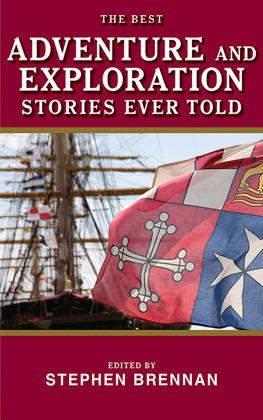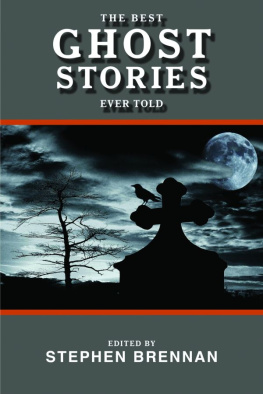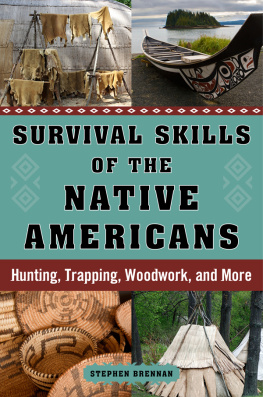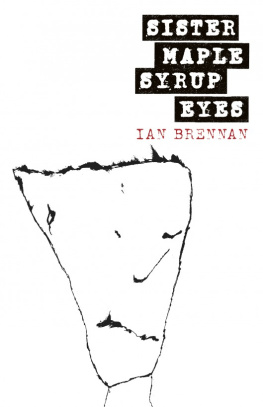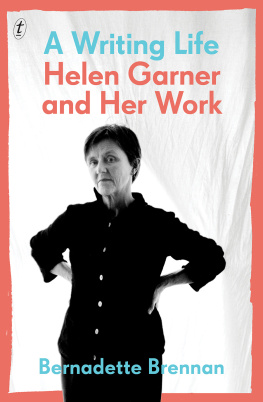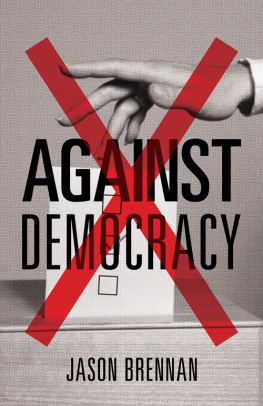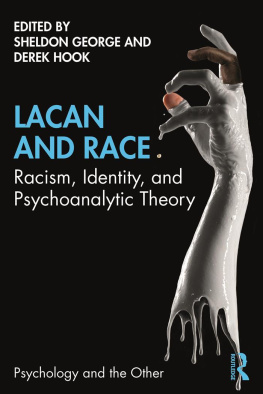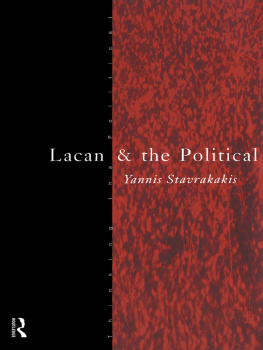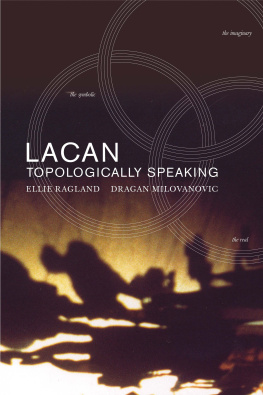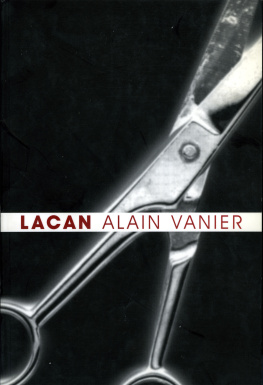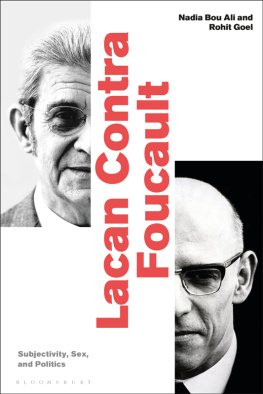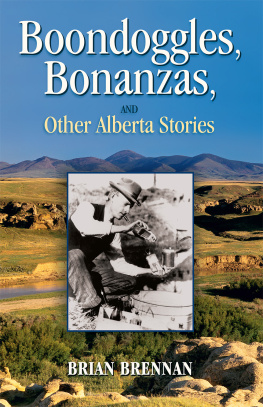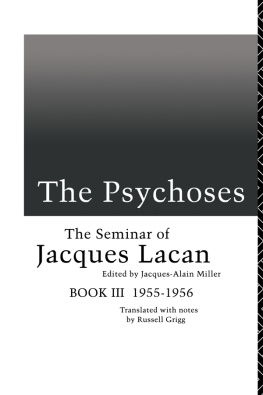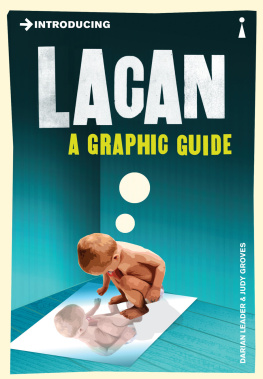Brennan - History after Lacan
Here you can read online Brennan - History after Lacan full text of the book (entire story) in english for free. Download pdf and epub, get meaning, cover and reviews about this ebook. City: London, year: 2003, publisher: Routledge, genre: Romance novel. Description of the work, (preface) as well as reviews are available. Best literature library LitArk.com created for fans of good reading and offers a wide selection of genres:
Romance novel
Science fiction
Adventure
Detective
Science
History
Home and family
Prose
Art
Politics
Computer
Non-fiction
Religion
Business
Children
Humor
Choose a favorite category and find really read worthwhile books. Enjoy immersion in the world of imagination, feel the emotions of the characters or learn something new for yourself, make an fascinating discovery.

- Book:History after Lacan
- Author:
- Publisher:Routledge
- Genre:
- Year:2003
- City:London
- Rating:4 / 5
- Favourites:Add to favourites
- Your mark:
- 80
- 1
- 2
- 3
- 4
- 5
History after Lacan: summary, description and annotation
We offer to read an annotation, description, summary or preface (depends on what the author of the book "History after Lacan" wrote himself). If you haven't found the necessary information about the book — write in the comments, we will try to find it.
History after Lacan — read online for free the complete book (whole text) full work
Below is the text of the book, divided by pages. System saving the place of the last page read, allows you to conveniently read the book "History after Lacan" online for free, without having to search again every time where you left off. Put a bookmark, and you can go to the page where you finished reading at any time.
Font size:
Interval:
Bookmark:

First published 1993
by Routledge
11 New Fetter Lane, London EC4P 4EE
This edition published in the Taylor & Francis e-Library, 2003.
Simultaneously published in the USA and Canada
by Routledge
29 West 35th Street, New York, NY 10001
1993 Teresa Brennan. The moral right of the author has
been asserted.
All rights reserved. No part of this book may be reprinted orreproduced or utilized in any form or by any electronic,mechanical, or other means, now known or hereafter invented,including photocopying and recording, or in any informationstorage or retrieval system, without permission in writingfrom the publishers.
British Library Cataloguing in Publication Data
A catalogue record for this book is available from the British Library.
Library of Congress Cataloging in Publication Data
Brennan, Teresa
History after Lacan/Teresa Brennan.
p. cm.(Opening out)
Includes bibliographical references and index.
1. HistoryPhilosophy. 2. Lacan, Jacques,
191081.Contributions in philosophy of history. 3.
Political Economy. Title.
II. Series.
D.16.8.B7167 1993
901dc20 9317237
ISBN 0-203-00509-0 Master e-book ISBN
ISBN 0-203-20849-8 (Adobe eReader Format)
ISBN 0-415-01116-7 (hbk) ISBN 0-415-01117-5 (pbk)
For Susan James
This is the story of a social psychosis. It begins by recovering Lacans neglected theory of history. Contrary to received views, Lacan was not an ahistorical poststructuralist. Rather, he argues that we are in the grip of an egos eraan era that begins in the seventeenth century and climaxes in the present, leaving us all fairly mad.
History after Lacan draws on psychoanalysis, political economy and feminism. It argues that the psychical fantasies analysed not only by Lacan but also by Freud and especially Melanie Klein are microcosms of the macrocosmic process at work in the egos era. Brennan brings these dif ferent psychoanalytic theories together in her concept of the foundational fantasy.
In the egos era, the foundational fantasy, which founds subjects through splitting and repression of the mother, is acted out. It is acted out in relation to nature. Thus the fantasized attacks on the mothers body described in psychoanalytic case histories can also be read as a description of the dynamics underlying attacks on the natural environment.
To explain the relation between microcosm and macrocosm we need appropriate theories of space and time. Brennan starts to develop these by showing how profit requires an ever increasing spatio-temporal speeding up of natural production, a requirement which, in its turn, alters the physis we inhabit.
Teresa Brennan teaches at the University of Cambridge. She is the editor of Between Feminism and Psychoanalysis and author of The Interpretation of the Flesh.

Feminism for Today
General Editor:
Teresa Brennan
The Regime of the Brother
After the Patriarchy
Juliet Flower MacCannell
Feminism and the Mastery of Nature
Val Plumwood
Feminist theory is the most innovative and truly living theory in todays academies, but the struggle between the living and the dead extends beyond feminism and far beyond institutions. Opening Out will apply the living insights of feminist critical theory in current social and political contexts. It will also use feminist theory to analyse the historical and cultural genealogies that shaped those contexts.
While feminist insights on modernity and postmodernity have become increasingly sophisticated, they have also become more distant from the realpolitik that made feminism a force in the first instance. This distance is apparent in three growing divisions. One is an evident division between feminist theory and feminist popular culture and politics. Another division is that between feminism and other social movements. Of course this second division is not new, but it has been exacerbated by the issue of whether the theoretical insights of feminism can be used to analyse current conflicts that extend beyond feminisms proper field. In the postmodern theory he has helped build, the white male middle- class universal subject has had to relinquish his right to speak for all. By the same theoretical logic, he has also taken out a philosophical insurance policy against any voice uniting the different movements that oppose him, which means his power persists de facto, if not de jure. Currently, there are no theoretical means, except for fine sentiments and good will, that enable feminism to ally itself with other social movements that oppose the power networks that sustain the white, masculine universal subject. Opening Out aims at finding those means.
Of course, the analysis of the division between feminist and other social movements is a theoretical question in itself. It cannot be considered outside of the process whereby feminist theory and womens studies have become institutionalized, which returns us to the first division, between feminist practice and feminism in the academy. Is it simply the case that as womens studies becomes more institutionalized, feminist scholars are defining their concerns in relation to those of their colleagues in the existing disciplines? This could account both for an often uncritical adherence to a postmodernism that negates the right to act, if not speak, and to the distance between feminism in the institution and outside it. But if this is the case, not only do the political concerns of feminism have to be reconsidered, but the disciplinary boundaries that restrict political thinking have to be crossed.
Disciplinary specialization might also be held accountable for a third growing division within feminism, between theoretical skills on the one hand, and literary analysis and socio-economic empirical research on the other. Poststructuralist or postmodern feminism is identified with the theoretical avant garde, while historical, cultural feminism is associated with the study of how women are culturally represented, or what women are meant to have really done.
Opening Out is based on the belief that such divisions are unhelpful. There is small advantage in uncritical cultural descriptions, or an unreflective politics of experience; without the theoretical tools found in poststructuralist, psychoanalytic, and other contemporary critical theories, our social and cultural analyses, and perhaps our political activity, may be severely curtailed. On the other hand, unless these theoretical tools are applied to present conflicts and the histories that shaped them, feminist theory itself may become moribund. Not only that, but the opportunity feminist theories afford for reworking the theories currently available for understanding the world (such as they are) may be bypassed.
None of this means that Opening Out will always be easy reading in the first instance; the distance between developed theory and practical feminism is too great for that at present. But it does mean that
Font size:
Interval:
Bookmark:
Similar books «History after Lacan»
Look at similar books to History after Lacan. We have selected literature similar in name and meaning in the hope of providing readers with more options to find new, interesting, not yet read works.
Discussion, reviews of the book History after Lacan and just readers' own opinions. Leave your comments, write what you think about the work, its meaning or the main characters. Specify what exactly you liked and what you didn't like, and why you think so.

